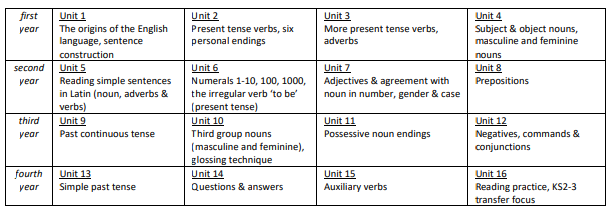Latin
Intent
At Halam C of E Primary School, we have chosen to teach Latin because of the rich opportunities that come with learning this ancient language. As well as being a fascinating language in its own right, knowledge of Latin helps to develop literacy skills. Through Latin, children develop their knowledge of spelling and vocabulary through learning Latin roots of English words and deepen their understanding of grammar. Alongside language learning, the study of Roman and Greek civilisations aids cultural literacy, encourages cultural insights and gives opportunities for wide-ranging thinking across many linked subjects (including history, philosophy, art, maths and science).
The national curriculum for languages aims to ensure that all pupils:
• Understand and respond to spoken and written language from a variety of authentic sources.
• Speak with increasing confidence, fluency and spontaneity, finding ways of communicating what they want to say, including through discussion and asking questions, and continually improving the accuracy of their pronunciation and intonation.
• Can write at varying length, for different purposes and audiences, using the variety of grammatical structures that they have learnt.
• Discover and develop an appreciation of a range of writing in the language studied.
At Halam, we deliver on the above aims through a weekly Latin programme, Maximum Classics, across Key Stage 2. Children receive weekly Latin lessons that include both language learning and classics (study of Ancient Rome and Greece), enabling them to make substantial progress in the language. Lessons provide a balance of spoken and written language, enabling children to understand and communicate ideas, facts and feelings in speech and writing. The focus is to provide a foundation for reading comprehension and an appreciation of classical civilisation.
Initially, both Maple Class and Oak class will study the curriculum units from the same starting point. After this, our bespoke training package and the teaching materials will need to be adapted to take account of our mixed aged classes. The units will also be extended to include further content at Years 5 and 6.
Implementation
Teaching and learning
The implementation of a clear and purposeful languages curriculum is at the heart of the subject’s success. Maximum Classics is a scheme and set of digital resources that teaches the Latin language in a way that enhances English literacy, both in its choice of vocabulary and grammar covered. It consists of sixteen Units, each with a particular grammar focus. It is designed to be teachable by non-specialist teachers and accessible by all abilities of student.

One of the main benefits of teaching Latin as a KS2 language is its useful interplay with English grammar and vocabulary. Maximum Classics’ introductory unit explores the history behind English’s links to Latin and Ancient Greek. Vocabulary used on the course is selected to facilitate the exploration of interplay between Latin and English vocabulary and every lesson incorporates games or activities drawing on this. The course also tracks KS2 elements such as word class, tense and auxiliary verbs.
Impact
The issuing of a Latin book to each pupil gives an opportunity for children to reflect on their work and take pride in their progress. A book also allows systematic recording of vocabulary, useful not only for encouraging word retention, but also useful for looking up words that have been forgotten. Books also afford the opportunity for teachers to comment on written work and can accompany the children through KS2, giving continuity in learning between academic years.
Regular summative testing Maximum Classics offers summative assessments with a children’s test at the end of each unit, testing comprehension and recall of key grammar, vocabulary and skills from the unit in question.
Learning Latin as a KS2 language puts children in a strong position to begin KS3 as competent and competent language learners. Children will learn vocabulary which is at the foundation of languages such as French and Spanish (which they will go on to study at the Minster School) and be encouraged to learn links with vocabulary and grammar between languages.

